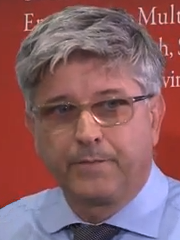Go to
Alessandro Cremonesi
 Vice President, Strategy and System Technology
Vice President, Strategy and System Technology
General Manager, Advanced System Technology Group
STMicroelectronics, Italy
The Future of Computing - Robotizing the World
Tuesday, 11 October 2016 at 14:00
Abstract:
In the last few years, the Internet of Things has come of age, riding the wave of advancements in sensing, communication, and actuating technologies; while new services and applications are being fueled by the evolution of integrated electronic systems and cloud technologies. What is emerging is more than just an evolutionary path but rather a radical shift that stems from the introduction of new cognitive technologies, adding to the mix the capability to ‘think’ and act autonomously. This is unlocking new ambitious goals and new computing paradigms that will strongly impact the way we manage our lives, work, social interactions and how we interact with our environment. One cornerstone of this new trend is the exploitation massive amounts of data being generated by the introduction of new ways to ‘learn’ from it. Technologies such as “deep learning” are demonstrating, via new training algorithms, results in terms of cognitive abilities which already far outperform more classical approaches to computer vision, signal processing, classification, data fusion and pattern matching. The computational complexity associated with such cognitive abilities has been until recent times too high for mass deployment, and even more so when one considers the pervasive scenarios of widespread sensor networks reaching billions of connected devices in a matter of years, with aggregated data throughput tapping into the zettabytes. This calls for a much higher level of distributed processing and intelligence that in traditional cloud-based offloading of high-intensity processing functions. The level of integration and processing power enabled by deep sub-nanometer VLSI technologies today is instrumental to surpass some critical thresholds when multiple Giga operations are already associated with relatively ‘simple’ classification tasks. Many new opportunities to take sensing devices to the next level are surfacing, exporting more semantically meaningful information while at the same time reducing their production and testing costs by way of the intrinsic error resilience of cognitive processing. However, there is not a single aspect of technology that will be left untouched by this shift, from smart industry 4.0 to personal service robots to energy, health, agriculture and much more. In this talk we will try to convey a high-level picture of what is happening, how and with what potential impact it will have on the future of computing, while new technologies are surfacing which show great potential - from silicon photonics to molecular computing and others - that will enable even more automation, or as we’ve called it: the “robotizing of the world”.
About the speaker:
Alessandro Cremonesi received a Doctorate in Electronics Engineering from the University of Pavia, Italy, in 1984. After a period of research activity in the opto-electronics field at the University of Pavia, he joined STMicroelectronics working in different fields, including telecommunications, audio/video digital signal processing and multimedia applications.
Currently, Dr. Cremonesi is Vice President of the Strategy and System Technology Group and General Manager of the Advanced System Technology (AST) group at STMicroelectronics, with the responsibility of corporate system research and development and corporate strategic marketing activities across 14 different STMicroelectronics Labs worldwide.
Secondary navigation
- EPFL Workshop on Logic Synthesis and Emerging Technologies
- Luca Amaru
- Luca Benini
- Giovanni De Micheli
- Srini Devadas
- Antun Domic
- Rolf Drechsler
- Pierre-Emmanuel Gaillardon
- Jie-Hong Roland Jiang
- Akash Kumar
- Shahar Kvatinsky
- Yusuf Leblebici
- Shin-ichi Minato
- Alan Mishchenko
- Vijaykrishnan Narayanan
- Ian O'Connor
- Andre Inacio Reis
- Martin Roetteler
- Julien Ryckaert
- Mathias Soeken
- Christof Teuscher
- Zhiru Zhang
- Symposium on Emerging Trends in Computing
- Layout synthesis: A golden DA topic
- EPFL Workshop on Logic Synthesis & Verification
- Luca Amaru
- Luca Benini
- Robert Brayton
- Maciej Ciesielski
- Valentina Ciriani
- Jovanka Ciric-Vujkovic
- Jason Cong
- Jordi Cortadella
- Giovanni De Micheli
- Antun Domic
- Rolf Drechsler
- Henri Fraisse
- Paolo Ienne
- Viktor Kuncak
- Enrico Macii
- Igor Markov
- Steven M. Nowick
- Tsutomu Sasao
- Alena Simalatsar
- Leon Stok
- Dirk Stroobandt
- Tiziano Villa
- Symposium on Emerging Trends in Electronics
- Raul Camposano
- Anantha Chandrakasan
- Jo De Boeck
- Gerhard Fettweis
- Steve Furber
- Philippe Magarshack
- Takayasu Sakurai
- Alberto Sangiovanni-Vincentelli
- Ken Shepard
- VENUE
- Panel on Circuits in Emerging Nanotechnologies
- Panel on Emerging Methods of Computing
- Panel on The Role of Universities in the Emerging ICT World
- Panel on Design Challenges Ahead
- Panel on Alternative Use of Silicon
- Nano-Bio Technologies for Lab-on-Chip
- Functionality-Enhanced Devices Workshop
- More Moore: Designing Ultra-Complex System-on-Chips
- Design Technologies for a New Era
- Nanotechnology for Health
- Secure Systems Design
- Surface Treatments and Biochip Sensors
- Security/Privacy of IMDs
- Nanosystem Design and Variability
- Past Events Archive

